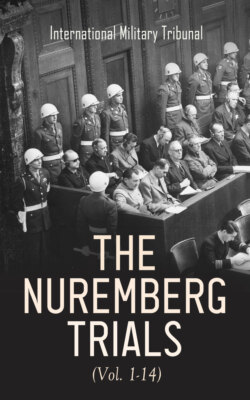Читать книгу The Nuremberg Trials (Vol. 1-14) - International Military Tribunal - Страница 175
На сайте Литреса книга снята с продажи.
KEITEL
ОглавлениеTable of Contents
Keitel is indicted on all four Counts. He was Chief of Staff to the then Minister of War Von Blomberg from 1935 to 4 February 1938; on that day Hitler took command of the Armed Forces, making Keitel Chief of the High Command of the Armed Forces. Keitel did not have command authority over the three Wehrmacht branches which enjoyed direct access to the Supreme Commander. OKW was in effect Hitler’s military staff.
Crimes against Peace
Keitel attended the Schuschnigg conference in February 1938 with two other generals. Their presence, he admitted, was a “military demonstration,” but since he had been appointed OKW Chief just one week before he had not known why he had been summoned. Hitler and Keitel then continued to put pressure on Austria with false rumors, broadcasts, and troop maneuvers. Keitel made the military and other arrangements, and Jodl’s diary noted “the effect is quick and strong.” When Schuschnigg called his plebiscite, Keitel that night briefed Hitler and his generals, and Hitler issued “Case Otto” which Keitel initialed.
On 21 April 1938 Hitler and Keitel considered making use of a possible “incident,” such as the assassination of the German Minister at Prague, to preface the attack on Czechoslovakia. Keitel signed many directives and memoranda on “Fall Gruen”, including the directive of 30 May containing Hitler’s statement: “It is my unalterable decision to smash Czechoslovakia by military action in the near future.” After Munich, Keitel initialed Hitler’s directive for the attack on Czechoslovakia, and issued two supplements. The second supplement said the attack should appear to the outside world as “merely an act of pacification and not a warlike undertaking.” The OKW Chief attended Hitler’s negotiations with Hacha when the latter surrendered.
Keitel was present on 23 May 1939 when Hitler announced his decision “to attack Poland at the first suitable opportunity”. Already he had signed the directive requiring the Wehrmacht to submit its “Fall Weiss” timetable to OKW by 1 May.
The invasion of Norway and Denmark he discussed on 12 December 1939 with Hitler, Jodl, and Raeder. By directive of 27 January 1940 the Norway plans were placed under Keitel’s “direct and personal guidance.” Hitler had said on 23 May 1939 he would ignore the neutrality of Belgium and the Netherlands, and Keitel signed orders for these attacks on 15 October, 20 November, and 28 November 1939. Orders postponing this attack 17 times until spring all were signed by Keitel or Jodl.
Formal planning for attacking Greece and Yugoslavia had begun in November 1940. On 18 March 1941 Keitel heard Hitler tell Raeder complete occupation of Greece was a prerequisite to settlement, and also heard Hitler decree on 27 March that the destruction of Yugoslavia should take place with “unmerciful harshness.”
Keitel testified that he opposed the invasion of the Soviet Union for military reasons, and also because it would constitute a violation of the Non-aggression Pact. Nevertheless he initialed “Case Barbarossa,” signed by Hitler on 18 December 1940, and attended the OKW discussion with Hitler on 3 February 1941. Keitel’s supplement of 13 March established the relationship between the military and political officers. He issued his timetable for the invasion on 6 June 1941, and was present at the briefing of 14 June when the generals gave their final reports before attack. He appointed Jodl and Warlimont as OKW representatives to Rosenberg on matters concerning the Eastern Territories. On 16 June he directed all army units to carry out the economic directives issued by Göring in the so-called “Green Folder,” for the exploitation of Russian territory, food, and raw materials.
War Crimes and Crimes against Humanity
On 4 August 1942 Keitel issued a directive that paratroopers were to be turned over to the SD. On 18 October Hitler issued the Commando Order which was carried out in several instances. After the landing in Normandy, Keitel reaffirmed the order, and later extended it to Allied missions fighting with partisans. He admits he did not believe the order was legal but claims he could not stop Hitler from decreeing it.
When, on 8 September 1941, OKW issued its ruthless regulations for the treatment of Soviet POW’s, Canaris wrote to Keitel that under international law the SD should have nothing to do with this matter. On this memorandum in Keitel’s handwriting, dated 23 September and initialed by him, is the statement:
